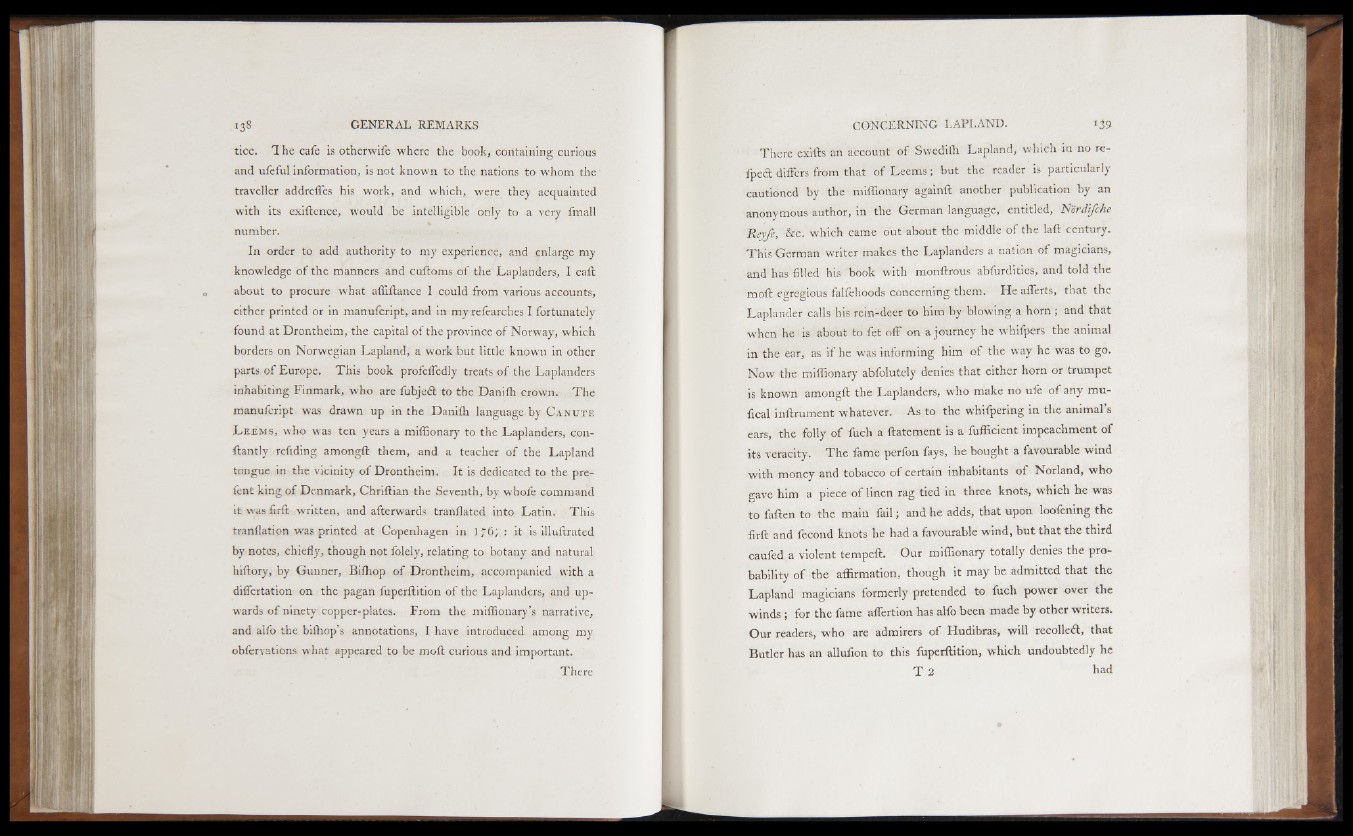
tice. 1 he cafe is otherwife where the book, containing curious
and ufeful information, is not known to the nations to whom the
traveller addreffes his work, and which, were they acquainted
with its exiftence, would be intelligible only to a very fmall
number.
In order to add authority to my experience, and enlarge my
knowledge of the manners and cultoms of the Laplanders, I caft
about to procure what affiftance 1 could from various accounts,
either printed or in manufcript, and in my refearches I fortunately
found at Drontheim, the capital of the province of Norway, which
borders on Norwegian Lapland, a work but little known in other
parts of Europe. This book profelfedly treats of the Laplanders
inhabiting Finmark, who are fubject to the Danilh crown. The
manufcript was drawn up in the Daniih language by C a n u t e
L e e m s , who was ten years a miffionary to the Laplanders, con-
ftantly refiding amongft them, and a teacher of the Lapland
tongue in the vicinity of Drontheim. I t is dedicated to the pre-
fent king of D enmark, Chriftian the Seventh, by whofe command
it was firft written, and afterwards tranflated into L atin , This
tranilation was printed at Copenhagen in ] 76; : it is illuftrated
by notes, chiefly, though not folely, relating to botany and natural
hiftory, by Gunner, Biihop of Drontheim, accompanied with a
differtation on the pagan fuperftition of the Laplanders, and upwards
of ninety copper-plates. From the miffionary’s narrative,
and alfo the biihop’s annotations, I have introduced among my
obfervations what appeared to be moil; curious and important. I
There
There exifts an account of Swedilb Lapland, which in no re-
fpeft differs from that of L eems; but the reader is particularly
cautioned by the miffionary againft another publication by an
anonymous author, in the German language, entitled, Ndrdifche
Rey/e, &c. which came out about the middle of the laft century.
This German writer makes the Laplanders a nation of magicians,
and has filled his book with monftrous abfurdities, and told the
moft egregious falfehoods concerning them. He afferts, th a t the
Laplander calls his rein-deer to him by blowing a horn ; and that
when he is about to fet off on a journey he whifpers the animal
in the ear, as if he was informing him of the way he was to go.
Now the miffionary abfolutely denies that either horn or trumpet
is known amongft the Laplanders, who make no ule of any mu-
fical inftrument whatever. As to the whifpering in the animal’s
ears, the folly of fuch a ftatement is a fufficient impeachment of
its veracity. T h e fame perfon fays, he bought a favourable wind
with money and tobacco of certain inhabitants o f Norland, who
gave him a piece of linen rag tied in three knots, which he was
to faften to the main fail; and he adds, that upon looiening the
firft and fecond knots he had a favourable wind, but that the third
caufed a violent tempeft. Our miffionary totally denies the probability
of the affirmation, though it may be admitted th a t the
Lapland magicians formerly pretended to fuch power over the
winds ; for the fame affertion has alfo been made by other writers.
Our readers, who are admirers of Hudibras, will recoiled, that
Butler has an allufion to this fuperftition, which undoubtedly he
X 2 had